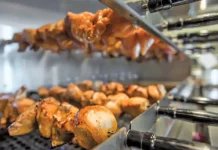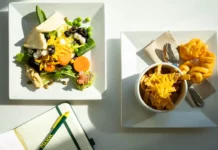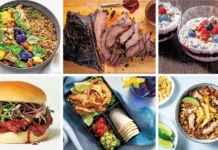
Article contributed by Francine L. Shaw
Experts estimate that up to 15 million Americans have food allergies, including 5.9 million children under age 18. Approximately 1 in 13 children, or roughly two in every classroom, have a food allergy, according to Food Allergy Research and Education (FARE).
The Centers for Disease Control & Prevention (CDC) reports that food allergies are on the rise, citing that food allergies in children increased by 50 percent between 1997 and 2011. Additionally, peanut and tree nut allergy appear to have more than tripled among U.S. children between 1997 and 2008. Every three minutes, a food allergy reaction sends someone to the emergency room, per FARE.
The “Big 8” foods – responsible for 90% of all allergic responses – are milk, eggs, peanuts, tree nuts, soy, wheat, fish and shellfish. Sesame has become such a prevalent allergen that we may soon be discussing the ”Big 9,” as manufacturers may soon label for the presence of this ingredient, as well. While these allergens are most common, people can also have severe allergic reactions to a wide variety of other foods and spices, including mushrooms, mustard, beef, cinnamon, eggplant and many more.
With the increase in food allergies comes legislation aimed at protecting food-allergic consumers. More than a decade ago, the Food Allergen Labeling and Consumer Protection Act was passed, requiring food packaging to more clearly identify its ingredients. Ingredient “aliases” were to be specified clearly (e.g., if a product contained casein, a milk product, it had to be labeled as containing milk.) And some customer-focused corporations have started becoming more allergy aware. Several major airlines (United, JetBlue, Southwest) stopped serving peanuts, one of the most common and dangerous food allergies, on their flights.
There’s also a trend in the food service industry to become more aware of food allergies and more willing to accommodate food-allergic guests. While we’re definitely moving in the right direction, some food businesses are more aware and accommodating than others. We need to continue moving the needle, educating additional food businesses and professionals to be allergy-aware.
It’s imperative that all food service professionals are well-educated around food allergies. People must understand that food allergies are serious and that making mistakes when preparing food-allergic guests’ food can (literally) kill them. Every food service employee should work tirelessly to prevent errors.
While, obviously, the first priority is to keep guests safe, it’s also important to recognize that mistakes around food allergies can devastate a business. A mistake can be extremely costly (legal fees, decreased business) and can ruin a restaurant’s (or other food business’s) reputation.
Here are some tips to become more food allergy friendly:
- Train your team on food allergy protocols. Ongoing training is a critical step in creating an allergy-friendly environment. All staff should be educated about food allergies and your specific food allergy protocols. There are numerous on-line classes, webinars, videos, and live classes that can assist you with this endeavor. Offer “refresher training” regularly to keep this information top-of-mind.
- Communicate with your guests and staff. This is critical. Always ask customers about food allergies and communicate that information (clearly and promptly) to everyone that will be involved in prepping, cooking or serving that food.
- Avoid cross-contact. Cross-contact occurs when proteins from foods containing an allergen are transferred to foods not containing that allergen, such as chopping peanuts on a board and then chopping salad greens on that same board. A peanut-allergic guest could have a reaction from eating the greens that came into contact with the peanuts during prep. The difference between cross-contact and cross-contamination is that anyone can become ill from cross-contamination if they eat foods that have touched raw meats or poultry. Cross-contact is dangerous only for food-allergic guests, who may inadvertently ingest their allergens if proper care wasn’t taken during food prep.
- Stock your kitchen to accommodate food-allergic guests. Disney World’s various restaurants and theme-park kiosks are renowned for their ability to accommodate food-allergic guests. They stock their kitchens with gluten-free breads, rolls, pastas, and even pancake and waffle mixes. They have non-dairy milks and ice creams. They keep a supply of desserts free from the Big 8 allergens. Adopt this practice by stocking allergy-friendly items that you can use when cooking meals for food-allergic guests, and they’ll be thrilled by your willingness and ability to accommodate them.
- Create a separate allergy-friendly workspace in your kitchen. Utilize this space to prepare allergen-free/gluten-free meals. Use separate equipment (ideally color-coded) that’s designated allergy-friendly. Also, serve allergen-free/gluten-free meals on different-shaped or different-colored plates so they can be easily identified by servers and guests.
- Know every ingredient used in every component of every meal on the menu. Double-check ingredients when serving food-allergic guests. Read ingredient lists carefully. Be aware of any “secret ingredients” in recipes that could be problematic – e.g., some chefs put peanut butter in chili, there’s often butter in buffalo wings, the anchovies in Caesar salads and Worcestershire sauce make them off-limits for someone with fish allergies.
- Use separate equipment for food-allergic guests. For instance, don’t use the same fryer (or oil) for French fries that you use for breaded products, fish or foods containing nuts. Know what type of oil is in your fryers. If it’s peanut oil, recognize that peanut-allergic guests can’t have any fried foods at your establishment.
- Be aware of multiple and complex allergies. Your team may have mastered cooking and serving a dairy-free or egg-free meal, but they should also be able to expertly handle multiple and unusual allergies.
- Be willing to modify dishes for food-allergic guests, using different sauces, sides or other components to accommodate their special dietary restrictions. Show enthusiasm for substituting gluten-free pasta or pizza crust, demonstrate your ability to make an egg-free hollandaise sauce. Guests will remember your willingness to create something delicious and safe for them, and they’ll be fiercely loyal to you because of it.
Create an allergy-friendly culture, where everyone on your staff takes food allergies seriously. Show your education and training by communicating effectively, demonstrate that you’re allergy-friendly by stocking your kitchen with “free of” products, use special colored or shaped plates (or frill picks) to indicate allergy-friendly meals. Prioritize food safety and your commitment to keeping every customer safe. By doing so, you’ll boost your business, as food-allergic consumers actively search for establishments that can accommodate them. Proven allergy-friendly establishments earn brand loyalty, and therefore, increase profitability through repeat customers and positive word-of-mouth reviews.
Francine L. Shaw is President of Savvy Food Safety, Inc. which offers a robust roster of services, including consulting, food safety education, food safety inspections, crisis management training, writing norovirus policies for employees, writing norovirus clean-up procedures, curriculum development, responsible alcohol service training, and more. The Savvy Food Safety team has more than 100 combined years of industry experience in restaurants, casinos, and convenience stores and has helped numerous clients prevent foodborne illnesses. Francine is a well-respected international speaker, and has been featured as a food safety expert in numerous media outlets, including the Dr. Oz Show, the Huffington Post, iHeartRadio, Food Safety News, Food Management Magazine and Food Service Consultants Society International.
























Comments are closed.